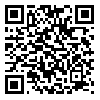Volume 13, Issue 3 (Vol.13, No.3, Atumn 2017)
irje 2017, 13(3): 174-182 |
Back to browse issues page
Download citation:
BibTeX | RIS | EndNote | Medlars | ProCite | Reference Manager | RefWorks
Send citation to:



BibTeX | RIS | EndNote | Medlars | ProCite | Reference Manager | RefWorks
Send citation to:
Etemad K, Heidari A, Panahi M, Lotfi M, Fallah F, Sadeghi S. Challenges of Access to Data of Ministry of Health from the Perspective of Policy-makers, Producers, and Consumers of Data: A Qualitative Study. irje 2017; 13 (3) :174-182
URL: http://irje.tums.ac.ir/article-1-5814-en.html
URL: http://irje.tums.ac.ir/article-1-5814-en.html
1- Assistant Professor, Department of Epidemiology, Environmental and Occupational Hazards Control Research Center, Faculty of Public Health, Shahid Beheshti University of Medical Sciences, Tehran, Iran
2- PhD Candidate of Health Policy, Health Management and Social Development Research Center, Golestan University of Medical Sciences, Gorgan, Iran ,ar-heidari@ farabi. tums. ac.ir
3- PhD Candidate of Epidemiology, Department of Epidemiology and Biostatistics, Tehran University of Medical Sciences, Tehran, Iran
4- MSc, Health services Management, Office of Knowledge Translation and Research Utilization, Vice-Chancellery for Research, Tehran University of Medical Sciences, Tehran, Iran
5- Msc Student of Health Education and Promotion, Faculty of Public Health, Shahid Beheshti University of Medical Sciences, Tehran, Iran
6- 6- Msc Student of Health Education and Promotion, Faculty of Public Health, Shiraz University of Medical Sciences, Shiraz, Iran
2- PhD Candidate of Health Policy, Health Management and Social Development Research Center, Golestan University of Medical Sciences, Gorgan, Iran ,
3- PhD Candidate of Epidemiology, Department of Epidemiology and Biostatistics, Tehran University of Medical Sciences, Tehran, Iran
4- MSc, Health services Management, Office of Knowledge Translation and Research Utilization, Vice-Chancellery for Research, Tehran University of Medical Sciences, Tehran, Iran
5- Msc Student of Health Education and Promotion, Faculty of Public Health, Shahid Beheshti University of Medical Sciences, Tehran, Iran
6- 6- Msc Student of Health Education and Promotion, Faculty of Public Health, Shiraz University of Medical Sciences, Shiraz, Iran
Abstract: (6742 Views)
Background and Objectives: Data plays a major role in a health care system in development planning and health services support if they are correct, timely and accessible. The data of the Ministry of Health are not readily available and the limited access reduces their value. The aim of this study was to explore the challenges of access to the data of the Iranian Ministry of Health.
Methods: This qualitative study was conducted in 2015. Twenty-three academic and administrative experts were selected purposefully. Semi-structured interviews were conducted to collect the data. The transcripts of the interviews were analyzed using content analysis.
Results: The results of this study provided 4 main themes (challenges of access to the data of the surveillance system, challenges of access to the data of national surveys and ordered projects, challenges of access to the data of electronic health records, and challenges of access to confidential data) and 15 sub-themes.
Conclusion: Given the multiple challenges of access to the data of the Iranian Ministry of Health, it is suggested to design access mechanisms in a systematic manner in the form of guidelines and organizational structures for data access management.
Methods: This qualitative study was conducted in 2015. Twenty-three academic and administrative experts were selected purposefully. Semi-structured interviews were conducted to collect the data. The transcripts of the interviews were analyzed using content analysis.
Results: The results of this study provided 4 main themes (challenges of access to the data of the surveillance system, challenges of access to the data of national surveys and ordered projects, challenges of access to the data of electronic health records, and challenges of access to confidential data) and 15 sub-themes.
Conclusion: Given the multiple challenges of access to the data of the Iranian Ministry of Health, it is suggested to design access mechanisms in a systematic manner in the form of guidelines and organizational structures for data access management.
Type of Study: Research |
Subject:
General
Received: 2017/11/29 | Accepted: 2017/11/29 | Published: 2017/11/29
Received: 2017/11/29 | Accepted: 2017/11/29 | Published: 2017/11/29
Send email to the article author
| Rights and permissions | |
 |
This work is licensed under a Creative Commons Attribution-NonCommercial 4.0 International License. |





